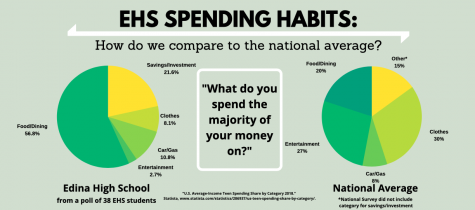What does EHS do to alleviate financial stress?
With Edina having the reputation of being mainly high-income, not many people are aware of the number of low-income families in the area. However, there are a few programs in Edina that help relieve financial burdens and have been successful in doing so.
One of these programs is Edina Give and Go, which focuses on removing financial barriers for students’ participation in academic, artistic, and athletic opportunities. They do this by providing up to $500 per school year and summer for qualifying students.
Maggie McCracken, the executive director of Edina Give and Go, has had many opportunities to work with economically disadvantaged families. “Low-income families are more common than you would think, and that’s mainly how it started,” McCracken said. “In communities like ours where the percentage is low, the conversation never gets brought up, and students can be forgotten and not seen. The more we recognize that not every student is the same, the better we can improve our system.”
However, there are certain requirements to be involved in this program. Edina Give and Go supports the nine percent of Edina Public Schools students that live in households earning 20% or below the poverty line. For a family of four, this would be $50,000 annually.
The program has done a great job of reaching out to people, and it has provided over $23,000 in support to students. Not only has it assisted students in school, but also with outside programs such as Driver’s Education, where it has supported over 75 students in the past two years.
The program has been extremely successful in contacting students and helping them succeed through high school. In fact, there are about 750 students total across all nine schools who are involved in this program. Not only that, but EHS also has 8.3% of students on federal free and reduced lunch program, also known as FRL. This program helps out students who don’t have enough money to pay for lunch, allowing them to have a healthy meal at school. However, there are not a lot of students who are aware of the financial situations of others, as it is often a touchy subject that people do not openly share. Even though kids don’t know each other’s financial situation, many are still aware that Edina has economically disadvantaged students. “There are all kinds of different people here with different financial situations. I think a lot of people are aware, but not many address it because no one really cares how rich you are. It’s also a really personal topic,” an anonymous EHS student said.
Maggie McCracken encourages students to get involved in Edina Give and Go if they are looking for support to alleviate financial barriers. The school is here to help you, and if you’re interested, visit edinagiveandgo.org.
How much does a good education really cost?
There are multiple ways that money can influence a student’s education: parents legally donating money to universities, rewarding their children for their grades, or investing in a tutor. While parents think that these acts are beneficial to their child, studies show that it can be quite the opposite.
In 2018, Harvard University received complaints about a“Dean’s Interest List”: a list created by the Dean of Admissions that is comprised of students whose parents donated to the school. Court records reveal that Harvard admitted 42.2% of students on the list, compared to their usual 5.4% acceptance rate. These donations gave them an edge on other applicants, an edge only attainable by the nation’s extremely wealthy. There have been similar occurrences at other universities such as Yale University, Stanford University, and UCLA.
Parents rewarding their students with money for good grades is also problematic. The New York Times reported that in a study where 25% of students were given rewards for good grades, 90% of the students said that they think their parents will love them more if they have better grades. The incentives can also cause mental health problems like perfectionism, depression, anxiety, and low self-esteem, as well as feelings of resentment or rejection towards parents. The concept of providing incentives reduces the student’s drive for learning. Rather than learning to become smarter, they learn to earn money; it creates a “what’s in it for me?” mindset.
The money spent on tutors also increases stress. Globally, private tutoring is a $96 million dollar industry as of the 2017 study by Zion Market Research, but the money might have been better spent elsewhere. A majority of students that receive tutoring feel pressured to earn good grades since their parents invested the money, and they want to make it worth it. The consequences can be issues like high stress and anxiety, but on the other hand, it can give students an improved approach to learning and more confidence in the classroom. Having a tutor can allow a student to work out specific issues and ultimately will benefit their academics, regardless of whether or not it has a negative effect on their mental health. It all comes down to each individual student. It’s also a luxury that not everyone has access to. For those that can’t receive tutoring, they could be facing more stress due to a lack of assistance when they’re left to figure out problems on their own. This once again gives an advantage to wealthier students in the college admissions process.
Any benefits that come from parents spending money on education is only available to the most fortunate. For those who can’t afford it, they don’t get the opportunity to receive benefits from tutors, providing rewards for grades, or donating to a college; a disadvantage that could be influential on their college admissions. The college admissions process should be based on meritocracy, not on money. These factors can make the already-stressful admissions process even more toxic for the students.



